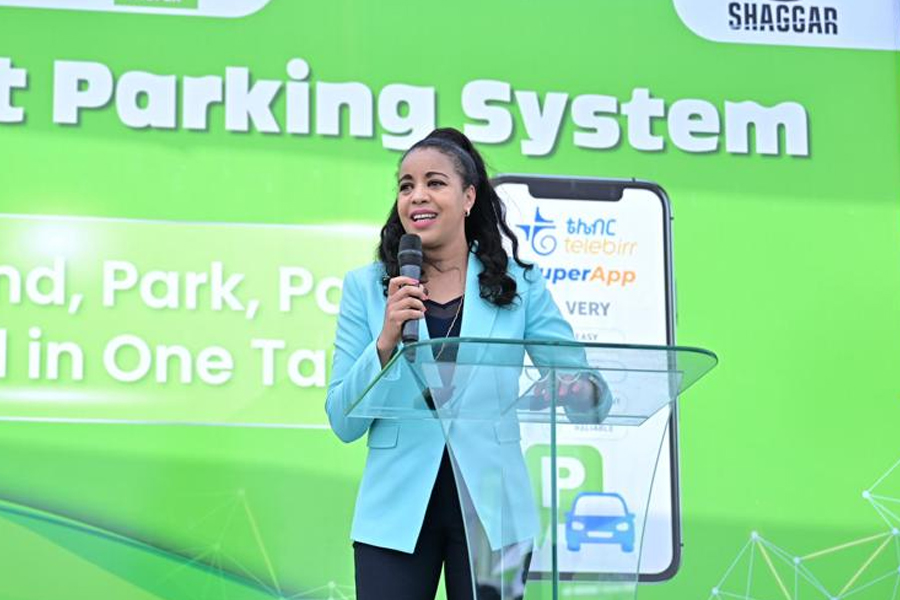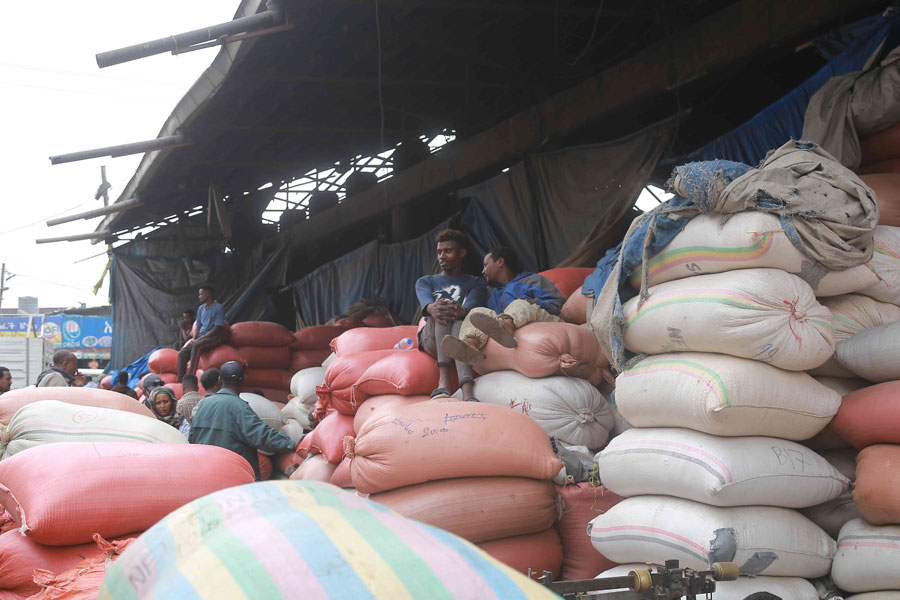
Fortune News | Jun 29,2025
Arada District Land Management & Administration Bureau, on Adwa St., near Berhanena Selam Printing Enterprise, was not just a place for paperwork last week. It was a venue where the drama of a city in transition played out, one story at a time.
The corridors embodied the vibrant marketplace of Piassa, a microcosm of Addis Abeba itself – now caught in the throes of a dramatic transformation. Residents' faces, etched with a mixture of anxiety and hope, filled the waiting area. Most were there to receive the 50,000 Br compensation package, a meagre consolation prize for the upheaval in their lives.
Weary elders occupied a few chairs, their bodies slumped under the weight of the wait. Others sprawled on the floor and stairs leading up to the office, the scorching sun sapping their already dwindling strength. They had been waiting since the morning for the updated list to make its way down from the wereda offices.
Aside from the crowd stood Shemima Redi, a lone figure in her mid-40s. Anticipation crackled in the air around her, unlike the worn file box clutched in her weathered hands. This seemingly ordinary file box held her future – or at least a part of it. Her home, nestled in the warren alleys of Piassa for 27 years, was slated for demolition.
The day, however, held a glimmer of hope.
Shemima had just learned that she had secured a ground-floor flat at the Fanuel condominium site, on the city's outskirts.
"I'm fortunate," Shemima told Fortune.
A hint of a smile evidently played on her lips.
Shemima's story mirrored 2,035 households in the Arada, one of the 11 districts of the capital.
Data on the housing stock in Addis Abeba is notoriously absent. The last population census was conducted in 2007, registering close to 629,000 houses, 24pc of them under wereda administrations. Over a million people have registered to receive public-funded condominium houses since, although the city administration could not meet half the demand in the subsequent years. However, private real estate companies have chipped in, raising the housing stock that experts still believe is less than a million units.
At the Arada District’s Land Bureau last week, each resident carried their burdens laced with hope – the emotional strain of displacement, the uncertainty of a new future, the fear of losing social ties and the dream of starting afresh. They faced a different reality.
For 54 homeowners, a lottery was drawn to allocate plots ranging from 75Sqm to 450Sqm along with financial packages. Half of those who live in public houses were relocated to a condominium built by the Belayneh Kinde Foundation within the District.
Addis Abeba Housing Development Corporation, which began providing housing on sale a month ago to pay back a staggering debt of 37.2 billion Br, has transferred around 716 condominium units in the past few weeks. About 1,100 residents, including Shemima, opted for this scheme, which offered a path to homeownership at either Furi, Hana Mariam Jemo, or Fanuel sites, albeit with the burden of scheduled financing.
According to Shimelis Tamrat, head of the Corporation, the condominium entrants will be part of the same financial model extended to prospective residents who have been saving up for nearly two decades.
"It's a business, after all," he told Fortune.
However, the excitement of owning a property was tempered by concerns about affordability. Shemima planned to relocate with her five children, and she is currently finding temporary refuge at a relative's home in Bishoftu town, Oromia Regional State. While the promise of a new home with potentially better living conditions brought joy, the logistics of fitting her entire family into a one-bedroom flat worries her deeply.
More pressingly, she needed to figure out how to finance the finishing touches required to make the bare-bones condo remotely habitable.
"I saw the place," she said. "Only its skeleton stands."
Her soon-to-be-gone neighbourhood, Piassa, was once a vibrant landmark humming with history. It was built by the occupying force of the Italians during the early years preceding the Second World War, where Benito Mussolini’s Fascist Party’s East Africa headquarters still standing but serving as a branch office of a private bank, ironically facing the newly built Adwa Museum.
The neighbourhood has become another casualty in the grand corridor development project, a multi-billion Birr behemoth reshaping the city's landscape. The allure of modernity, championed by Prime Minister Abiy Ahmed (PhD), promised a gleaming network of corridors pulsating through the city's heart. Night-time videos showcased Mayor Adanech Abebie outlining the project's purpose, her voice unwavering. Addis Abeba, she declared, needed to shed its “substandard skin” and embrace a global standing.
The solution – a network of gleaming corridors inspired by the Prime Minister’s call to connect the beautification projects scattered across the city.
The first phase is an eight-kilometre stretch beginning at the recently inaugurated Adwa Zero Kilometre Museum in Piassa. It would snake towards Friendship Park in Arat Kilo before looping back through Ras Mekonnen Bridge and returning to the Museum’s site. The Mayor justified the project by arguing that the area surrounding the Museum was not up to standards, with outdated sewerage lines and telecom installations.
"There might be casualties," she had warned.
The second 10 km corridor encompasses an extensive stretch from Arat Kilo, passing through Friendship Park and Abrehot Library and extending across the renovated Mesqel Square to Bole International Airport, bulldozing sideways on Africa Avenue. A 6.4Km pathway commences from Megenagna Square near the Chaka Satellite City, an outskirt of the city developing under the auspices of the Prime Minister's development initiatives through the Museum, culminating at Arat Kilo, where amphitheatres and plazas are envisioned.
Officials disclosed that Addis Abeba Finance and Trade bureaus are also slated to move from the iconic Arada Building, at the heart of Piassa. Bereket Takele, a press secretariat for the mayor's office, revealed that several bureaus under the city administration, from the Mega Project Office to the Green & Beautification Bureau, would be included in the development.
"No institution can complete the project independently," he told Fortune.
While he declined to disclose the project budget, he acknowledged that foreign financing would be included. External consultants were hired last year to find ways to connect passion projects that have developed since the current administration took office.
According to Germew Worqu, deputy commissioner of the Addis Abeba Planning Commission, the conception of the new corridor aligns with the master plan developed in 2017, which incorporates bicycle lanes, pedestrian walkways, green spaces, and public amenities to enhance the livability of the capital.
For Germew, lacking basic amenities like toilets in certain residential areas is a pressing concern. He lamented the lack of proper planning evident in various parts of the city, characterising them as squalor-like urban settings.
It is a legitimate concern that no less than 75pc of the city’s houses were made of wood, and half were more than 30 years old. City authorities often claimed to have covered 98pc of the city with access to tapped water. But only 32pc of houses have private connections, while 15pc have no toilets, and 62pc have shared lanterns. More than 80pc have no bathing facility, and 20pc have no kitchen.
"A properly planned city is essential," Geremew told Fortune.
The construction of pedestrian walkways and bicycle lanes has already begun.
According to an official from the city’s Roads Authority who requested anonymity, unlike other road projects, the corridor development would occur in phases without pre-feasibility studies. He revealed that expanding the four-metre width of the roads would be essential for meeting their target.
"We‘re expected to finish in three months," he told Fortune.
The rush is evident in the short notice given to residents relocated or property owners whose landholding is sliced to give way for the roads’ expansion. Guided by a two-year-old compensation directive, relocation procedures prioritise “equitable allotments” based on land grades and the initial construction materials used. City officials believe this could ensure affected individuals receive fair compensation and comparable accommodations in other parts of the city.
Last week, a proposed amendment on the expropriation of land for public purposes, compensation, and resettlement was introduced in Parliament. It will shift the responsibility for compensation payments from the federal to city administrations and regional authorities when ratified.
According to Tesfaye Beljege, the incumbent’s chief parliamentary whip, the process is burdensome and time-consuming. However, some Parliamentarians express doubts about regional governments' financial capacity, given their occasional struggles to pay salaries.
Wondwossen Admassie, an MP from the incumbent Prosperity Party (PP), advocates the idea of shared responsibilities. He raised concerns about the Ethiopian Roads Administration's outstanding debt of 14 billion Br over the past decade, warning of the potential for project delays if compensation payments are not effectively managed.
With a 1.1 billion Br compensation package approved by the City Cabinet to the Finance Bureau for Arada District, Addis Abeba is poised for a multi-billion Birr transformation. Land Development & Administration Bureau officials have begun gathering data and determining eligibility.
Desta Meriga, head of Land Preparation & Transfer at the Bureau, revealed that a team of 150 experts has been deployed solely for the District, acknowledging the magnitude of the task.
He oversaw lottery draws for approximately 66 individuals seeking resettlement within the same neighbourhood. Anticipating the relocation of around 188 businesses to nearby areas shortly, Desta disclosed that the Federal Housing Corporation has agreed to provide most of the alternative housing.
Nonetheless, the Grand Corridor Development Project (GCDP) has sparked a fierce debate within Addis Abeba. Some hail it as a necessary step towards modernisation, envisioning a city with improved infrastructure and a more aesthetically pleasant appearance. Others, however, raise concerns about the human cost. The displacement of thousands, the disruption of communities, and the potential loss of the city's historical character are downsides that should be considered.
Marco Di Nunzio, an anthropologist at the University of Birmingham, authored a book on Addis Abeba’s marginalised communities during expansion. He lived in the Piassa area for two years while researching for the book he titled, “The Art of Living.” He is concerned that beyond physical displacement, the demolitions represent an assault on the residents' sense of belonging and ownership over their city's present and future. His recent post on X, a social media platform formerly known as Twitter, says the fate of a neighbourhood resonated deeply with many.
Businesses that have flourished in the area for decades now find themselves having to relocate. Cherished establishments like the renowned dating spots Mekonnen Bar on Eden St., and Inter-Langano Hotel on Hailesellasie St., beloved by residents, as well as relatively recent hangouts like Mesi Gebeta and Dave Grocery, frequented by younger generations, have all been paid tribute to on social media platforms.
Of the jewellery stores, Anbessa Jewellery is one of the demolished shops that has been around for nearly three decades. Renowned for its custom designs chosen by couples for their prenuptial ceremonies, the family-owned establishment has been in business since the price of gold stood at 120 Br a gram, now hovering around 8,000 Br.
It has settled in the second shop at the Sapphire Hotel, on Namibia St, for now.
"We'll be back once rebuilding is done," Fiseha Abay, the proprietor, told Fortune.
While the rhetoric of a modern metropolis, with its vision of uniform colours and expansive boulevards, struck a chord with some, for a single mother of two and a custodian at a nearby commercial building, Tizita Begashaw, it was a harsh reality to confront.
She feels that the compensation offered—a modest sum along with a condominium flat located far on the outskirts—feels like a meagre consolation prize. While the prospect of a larger living space initially seems appealing, it is overshadowed by the financial strain of furnishing the new flat and the looming fear of losing her job.
"I'll have to find another work within the vicinity," she said.
Experts offer alternative approaches to urban development that may address the need for extensive demolitions. Adem Kedir, a lecturer in urban governance at Addis Abeba University, proposes the potential benefits of distributing development initiatives across cities. According to Adem, the City Administration's objectives of regenerating the capital can be achieved without resorting to large-scale demolitions.
"It seems that the primary objective is to attract tourists," he told Fortune.
The capital's historical development, which lacked centralised planning in its formative years, resulted in a dispersed settlement pattern as more people migrated in search of better economic opportunities.
Adem urged accelerating development in other cities to address high migration levels while concurrently enhancing infrastructure in the capital.
"Other regional capitals should be considered," Adem said.
The development project has far-reaching economic implications. While the immediate focus is on resettling displaced residents and businesses, officials believe the project's long-term vision promises a revitalised city centre brimming with economic potential. Meanwhile, with mixed feelings of hope and uncertainty, relocated residents like Shemima and Tizita are determined to land softly - one brick at a time, in the unfamiliar corners of Addis Abeba
PUBLISHED ON
Mar 23,2024 [ VOL
24 , NO
1247]

Fortune News | Jun 29,2025

Fortune News | Jan 05,2020

Fortune News | May 27,2023

Radar | Nov 16,2024

Advertorials | Sep 24,2024

Editorial | Aug 12,2023

Agenda | Nov 19,2022

Viewpoints | Jun 14,2025

Agenda | Mar 04,2023

Fortune News | Oct 13, 2024

Dec 22 , 2024 . By TIZITA SHEWAFERAW
Charged with transforming colossal state-owned enterprises into modern and competitiv...

Aug 18 , 2024 . By AKSAH ITALO
Although predictable Yonas Zerihun's job in the ride-hailing service is not immune to...

Jul 28 , 2024 . By TIZITA SHEWAFERAW
Unhabitual, perhaps too many, Samuel Gebreyohannes, 38, used to occasionally enjoy a couple of beers at breakfast. However, he recently swit...

Jul 13 , 2024 . By AKSAH ITALO
Investors who rely on tractors, trucks, and field vehicles for commuting, transporting commodities, and f...

Jul 12 , 2025
Political leaders and their policy advisors often promise great leaps forward, yet th...

Jul 5 , 2025
Six years ago, Ethiopia was the darling of international liberal commentators. A year...

Jun 28 , 2025
Meseret Damtie, the assertive auditor general, has never been shy about naming names...

Jun 21 , 2025
A well-worn adage says, “Budget is not destiny, but it is direction.” Examining t...